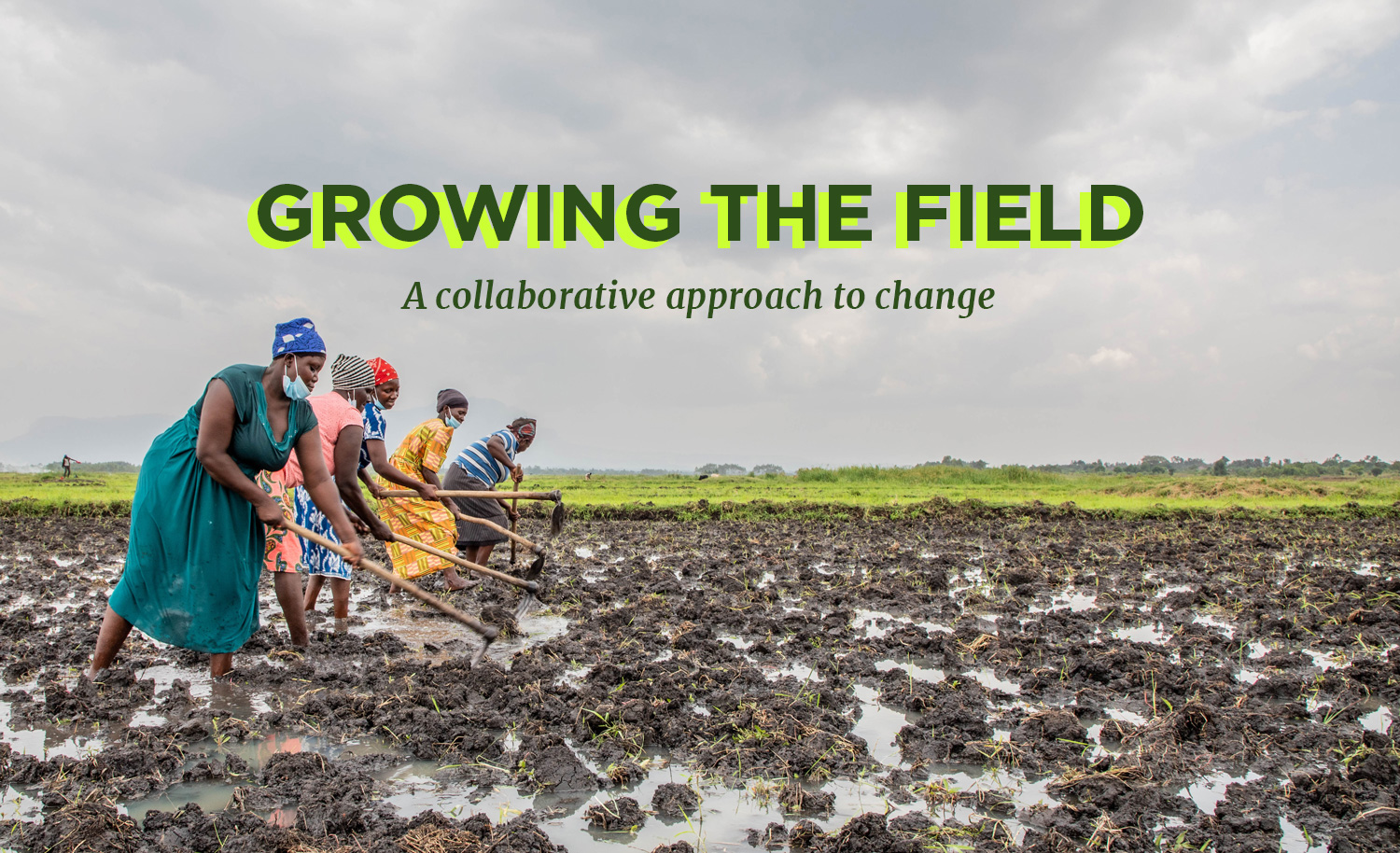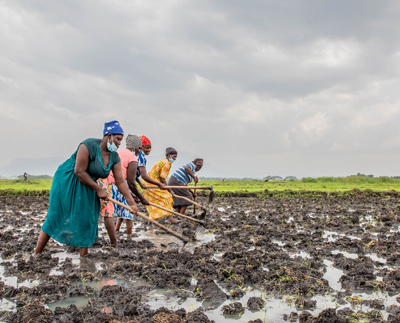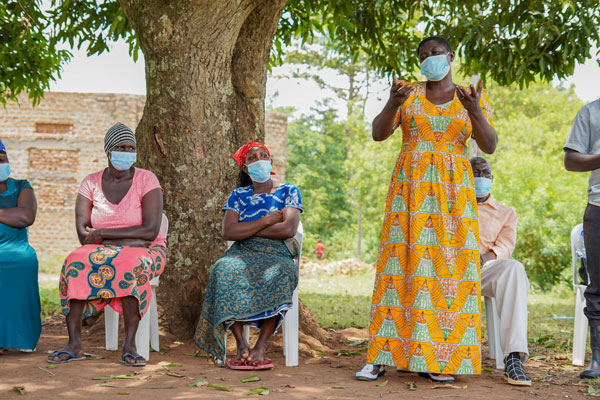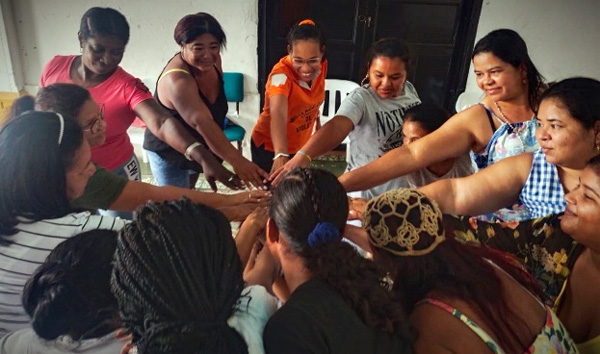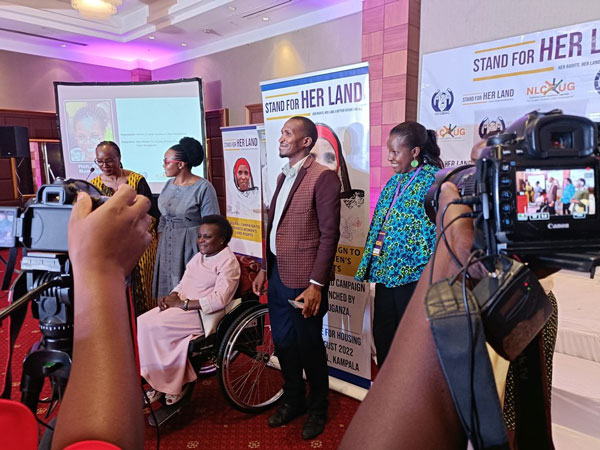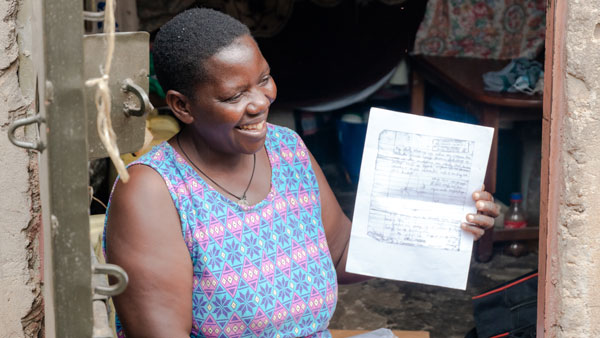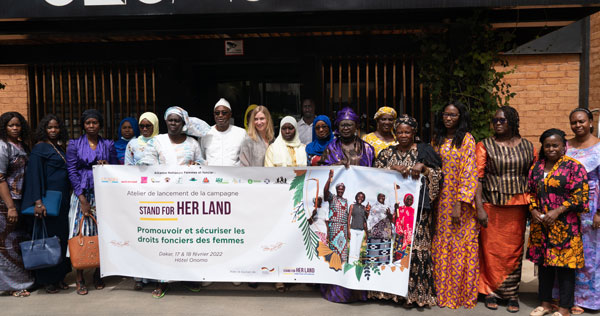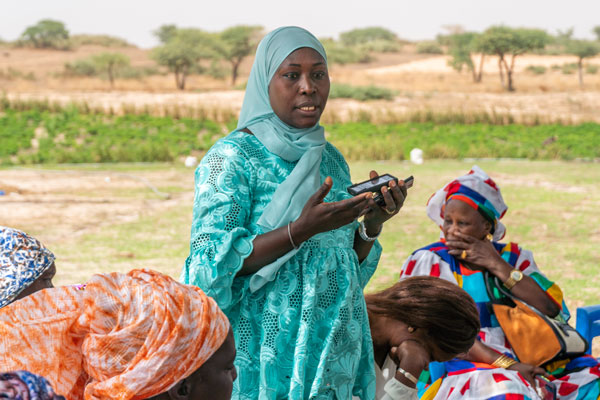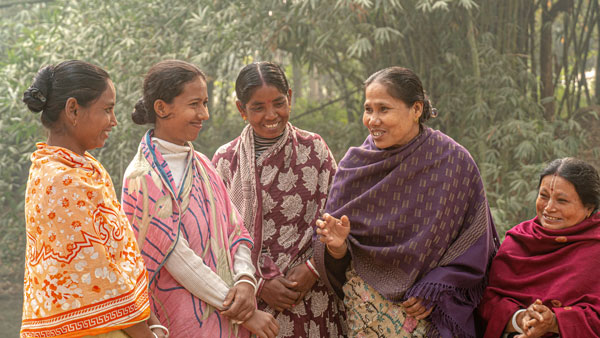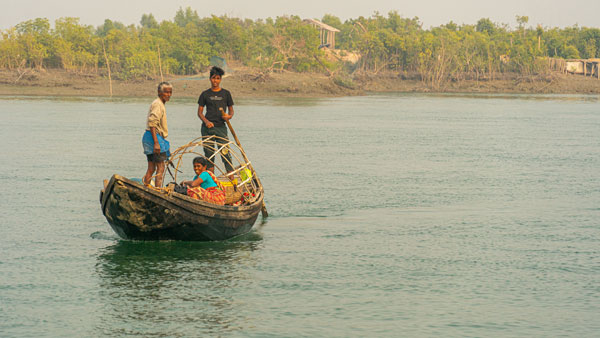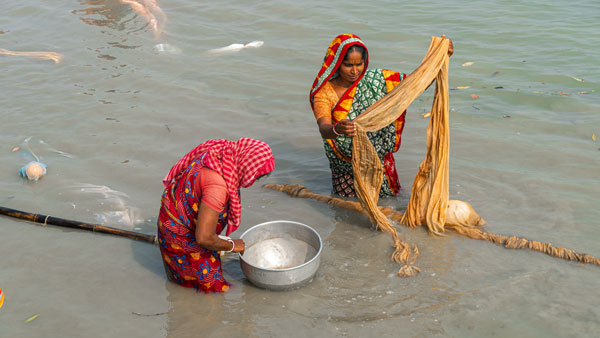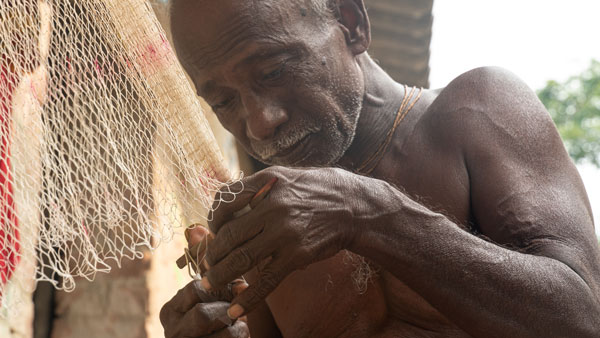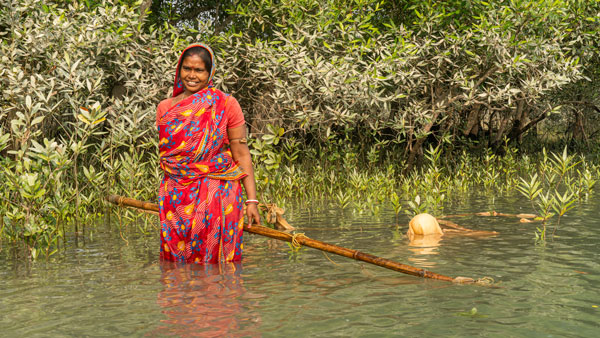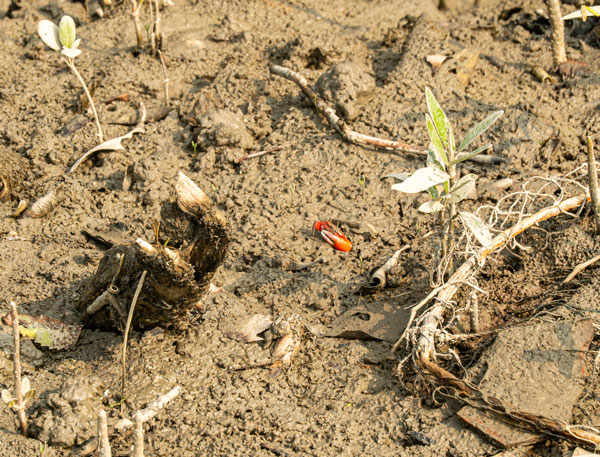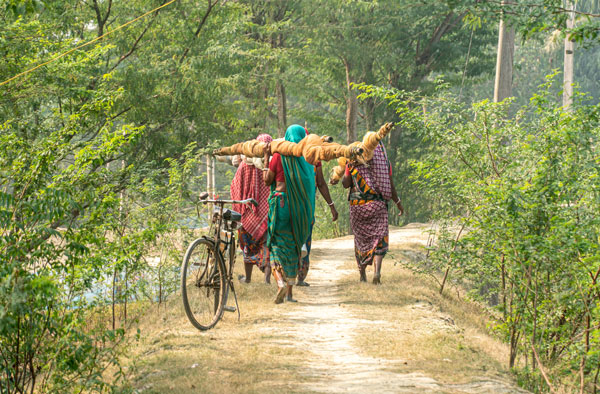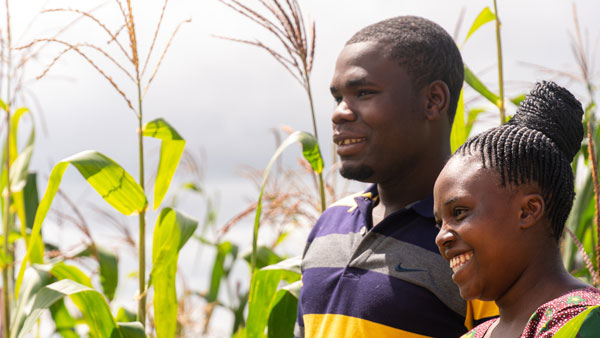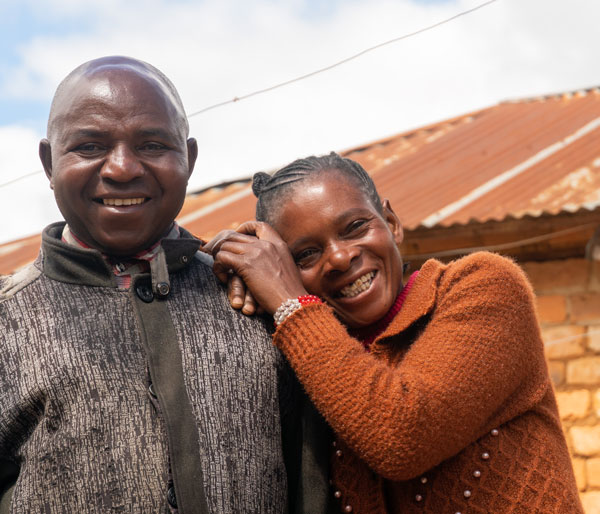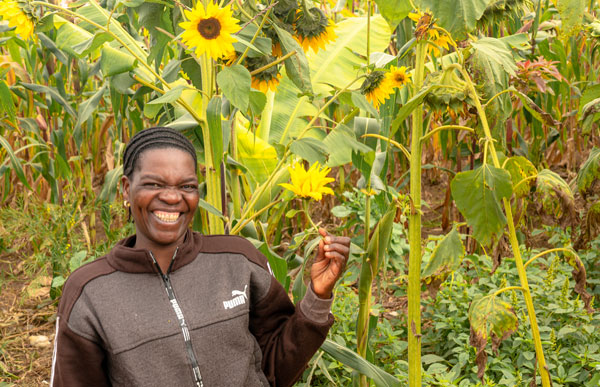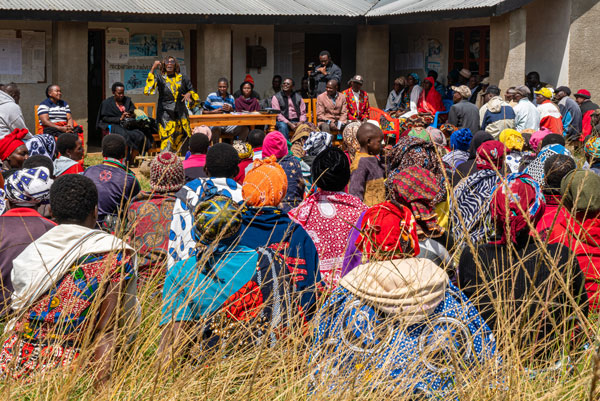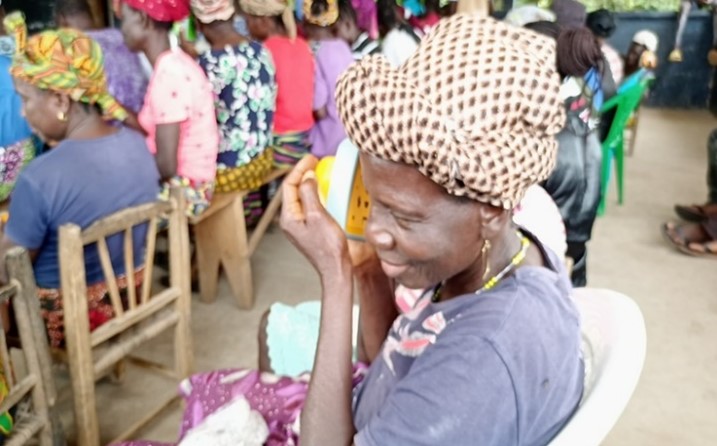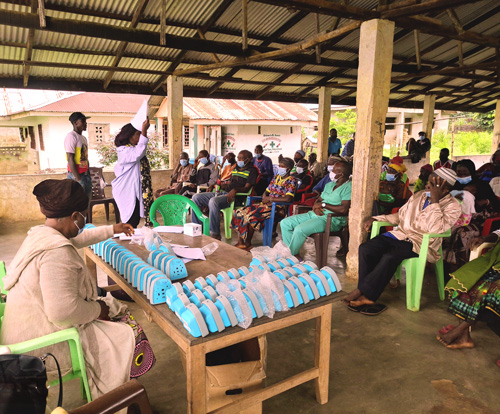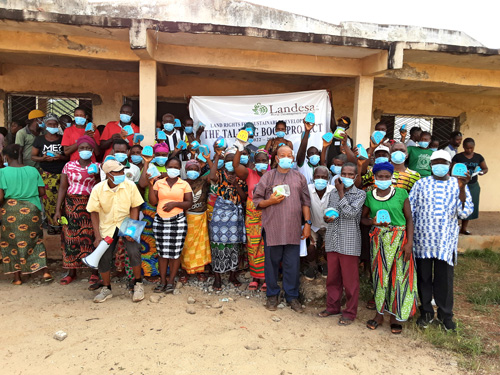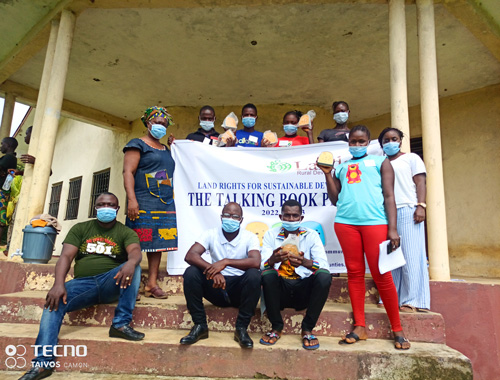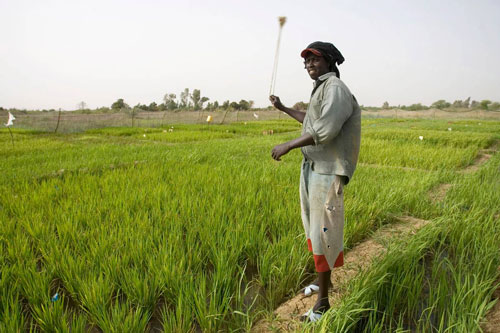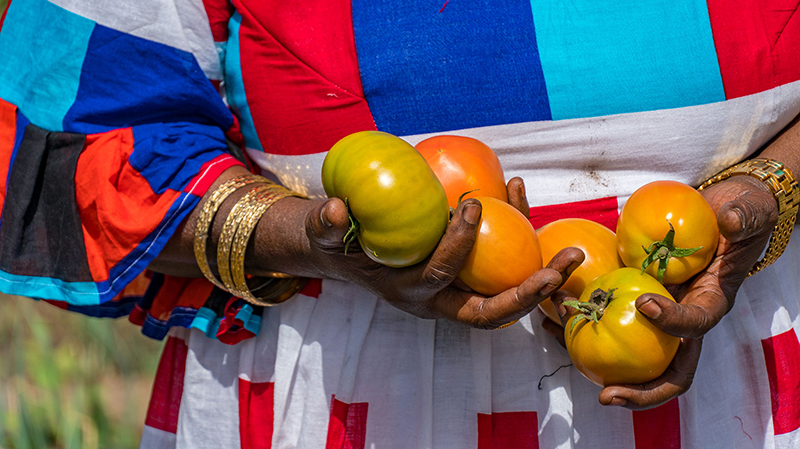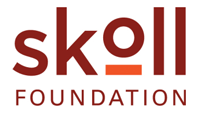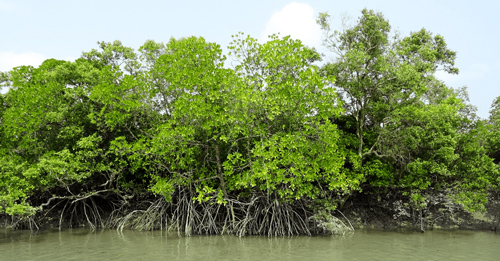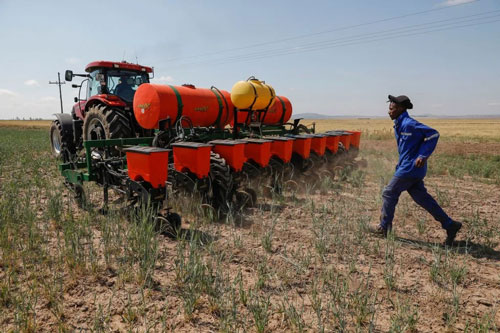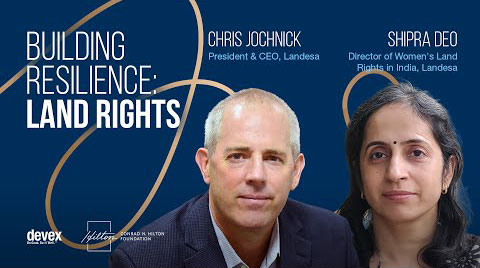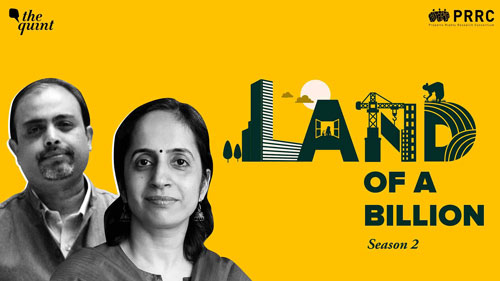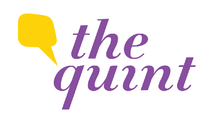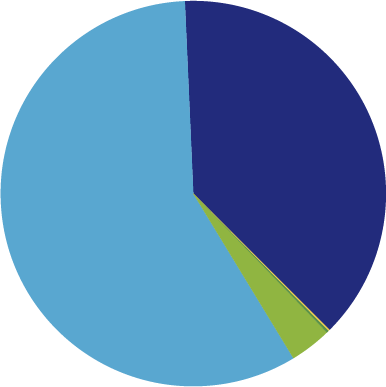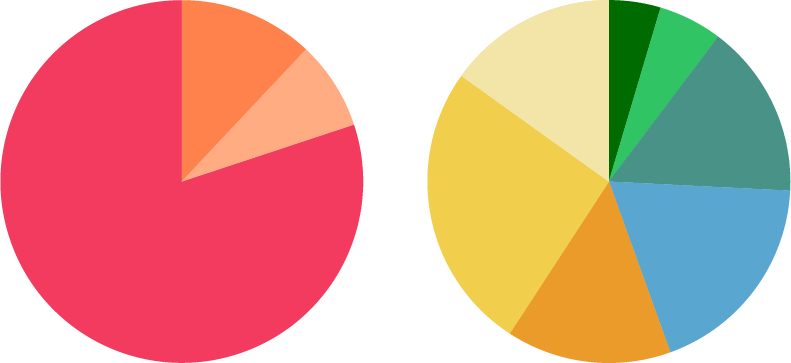Welcome to our 2022 Annual Report
Land rights are ascendant across the development sector. Movements addressing women’s empowerment, poverty, social justice, food security and climate change are all increasingly turning to land rights to strengthen their cause. In 2022, renowned philanthropist MacKenzie Scott joined these efforts by making an unprecedented $20 million investment in our work. Ms. Scott’s generous gift represents a profound endorsement of the power of land rights to improve the lives of women, men, and communities around the world.
This past year, Landesa greatly expanded its reach by cultivating partnerships in new countries in Africa and Asia and deepening work around women’s land rights, youth land rights, smallholder farmers, and climate change. In all of these efforts, Landesa has prioritized collaborations with national NGOs and grassroots organizations. These local groups and networks are essential to creating lasting change on the ground and represent the future of land rights advocacy.
Through its work as the Secretariat of the global campaign, Stand for Her Land, Landesa is helping to initiate, develop and support coalitions of local land rights advocates. Landesa and campaign partners have raised funds for country coalitions in Bangladesh, Colombia, Ethiopia, Senegal, Tanzania, and Uganda, which are now working to ensure that millions of women can realize stronger land rights in their daily lives. In six adjoining countries from India to Indonesia, Landesa is working with national organizations and government actors to help secure the rights of communities to protect and regenerate their mangrove forests – critical to livelihoods and the broader cause of climate change. In Cambodia, Landesa is simultaneously advocating for national-level policy reforms, while providing institutional support and land rights guidance to almost a dozen local NGOs.
The gift from MacKenzie Scott will supercharge these efforts. Over the coming years, we aim to strengthen the field of land rights by building the evidence base, encouraging global actors to support land rights efforts, and working with a broader range of advocates to bolster their capacities and influence. In terms of impact, Landesa has set the goal of helping 400 million rural women realize the benefits of stronger land rights by 2027.
This report provides a look back at a watershed year for Landesa – and a look ahead to what’s on the horizon. Thank you for walking this journey with us.


PROGRAM HIGHLIGHTS
GLOBAL TO GRASSROOTS
Collective advocacy furthers women’s land rights
Secure women’s land rights create a powerful ripple effect, with the potential to advance gender equality, economic empowerment, and climate resilience.
Landesa acts as Secretariat for Stand for Her Land (S4HL), the global campaign advancing women’s land rights through coalitions of grassroots women and women-led organizations. On International Women’s Day 2022, S4HL celebrated its Africa Regional Launch, adding national coalitions in Ethiopia, Senegal, and Uganda to join Tanzania on the continent. National coalition launches in Colombia and Bangladesh followed, with over 100 groups worldwide mobilizing for the campaign.
At the regional and global levels, S4HL helped put women’s land rights on the agenda at key advocacy moments, including the African Union’s mid-year meetings and at the 2022 United Nations Climate Change Conference (COP27). At COP27, S4HL representatives helped surface gender-just climate action and women’s land rights in critical conversations about the global response to climate change.
RESTORATION AND RESILIENCE ACROSS BORDERS
A regional initiative seeks to preserve sustainable livelihoods and ecosystems
Land use planning driven by people, for people, the planet and prosperity
Secure land rights are the bedrock for strengthening agriculture, advancing climate justice, and empowering rural communities. And who has a voice in decision-making on land use and access is a key component of equitable land management. In Tanzania, Landesa is supporting local efforts for community-centered land management, helping to ensure that all voices are heard – including women, youth, and others who are traditionally excluded from decision-making around land.
In partnership with the Mufindi District Council and PELUM Tanzania, Landesa supported government land use planning efforts to promote rural development that places communities in the foreground in decision making. In 2022, the collaboration successfully delivered over 4,000 Certificates of Customary Rights of Occupancy to smallholder farmers in eastern Tanzania, in conjunction with land rights education, village land mapping, and inclusive land use planning processes. More than 45% of these certificates were issued to women, jointly or individually and more than 19% to youth, increasing their ownership and control over land, and the power to decide how their land is used.
Landesa and partners encouraged communities to integrate climate resilience in land use plans, laying the groundwork for sustainable development in the face of climate shocks.
ADVANCING LAND RIGHTS EDUCATION AND ACCESS
In 2018, Liberia adopted the Land Rights Act, widely considered to be one of the most progressive land rights reforms on the African continent. Full implementation of this landmark legislation is contingent on widespread awareness on rights and challenging social norms such as those that deny women their rights to land. The new land law, for the first time offered the legal base for 2-3 million Liberians who live in rural areas to formally register and secure legal recognition of their land.
To increase access to legal information and education around the Land Rights Act in the face of low literacy rates in rural communities—particularly for women—Landesa collaborates with local organization DEN-L to circulate Amplio Talking Books, simple hand-held audio players with messages in local languages. Four hundred Talking Books are currently in circulation across 5 of Liberia’s 15 counties, offering messages on land rights in seven languages. Since 2020, over 41,275 Liberians have directly been reached through this program, having learned about the process to obtain land deeds, methods for land conflict resolution, and the importance of women’s land rights. Future topics will include sustainable land management and climate adaptation techniques, helping to promote more resilient livelihoods in the face of climate change.
In no place are the challenges of extreme poverty and food insecurity more pronounced than in sub-Saharan Africa – particularly in rural areas, where agriculture is the backbone of the economy, but land rights are frequently undocumented and insecure. And women farmers are overrepresented among those experiencing poverty, in large part because of discriminatory social norms that undermine their rights to land.
With the Agricultural Systems Change initiative, funded by Co-Impact, Landesa is partnering with One Acre Fund to transform food systems and create a more gender-equitable future for Africa’s smallholder farmers. In Kenya and Rwanda, Landesa will partner with government and other stakeholders to strengthen land rights for smallholder farmers, increase on-farm assets, and work to uproot social norms that deny women equal rights to land. These efforts will be led from new Landesa offices in Kenya and Rwanda and carried out by national teams of land and gender experts steeped in local contexts. In combination with access to improved seeds and other farm inputs, the program is expected to benefit nearly six million people across the two countries by 2025.
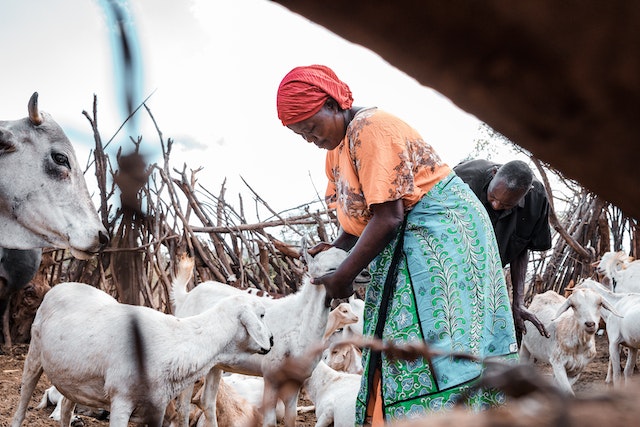
Around the world, women and girls are disproportionately impacted by climate change. They’re also critical allies in the fight to arrest the climate crisis, because of their roles as stewards of land and natural resources. But without secure rights to land, they are greatly diminished in their potential to protect land and forests that are critical for climate mitigation, or to help their communities adapt to extreme weather, food insecurity, and other severe consequences of climate change.
Landesa is working to spur regional collective action on climate change among women-led grassroots organizations in some of the most climate-vulnerable places in the world. The Women-led Collective Advocacy for Climate Action project, funded by the U.S. Department of State, will convene coalitions of women-focused organizations and develop national coalition climate strategies, with an emphasis on the role of women’s land rights to foster climate resilient communities in Bangladesh, Maldives, and Nepal. By centering climate action within women-led organizations, Landesa is putting the power to effect lasting change in the hands of those who are best positioned to act against climate change while fostering a regional network of climate activists.
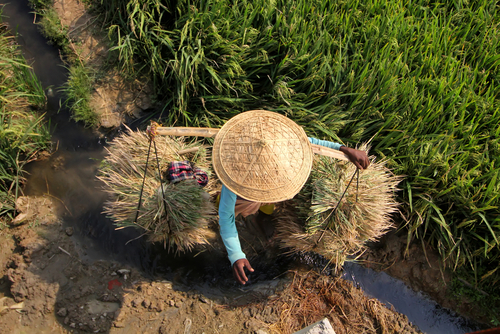
In Ghana, aspiring young farmers face many barriers in accessing land – a trend that can be observed across much of the continent, where lack of land rights keep youth sidelined from working in agriculture. The consequences of this gap in land rights contribute to high youth unemployment, propel social unrest and migration, and weaken food systems.
But with the right reforms to land rights, markets and changes to customary practices around who has the right to manage and access land, youth can be equipped with the tools and resources necessary to grow their livelihoods, increase access to decent jobs, improve food security, and transform agriculture across Africa. Landesa, in partnership with COLANDEF, a Ghanaian land rights NGO, is helping Ghana’s young farmers realize dignified employment through on-farm careers along value chains. Supported by the Mastercard Foundation, the project aims to improve land documentation and access as a pathway for strengthening and creating 1.3 million jobs for Ghanaian youth in agriculture and agriculture-adjacent opportunities by 2025, helping to usher in a new generation of African agri-preneurs.
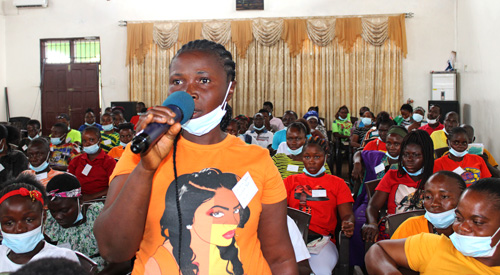
The sense of not belonging is an all-too-common experience for women in India and, indeed, around the world. Patriarchal notions about land and inheritance serve to deny women of their rights to land in their birth homes. But women who marry are likewise treated as outsiders in their marital homes and are thus caught between two worlds, an outsider in both.
In the state of Jharkhand in eastern India, Landesa is launching a new effort to strengthen the land rights of women living in Scheduled Tribe communities. The project builds upon Landesa's 2021 assessment that found persistent and widespread instances of social and legal barriers to land rights for women in the state. With continued funding from Oak Foundation, Landesa’s land and gender experts are applying what we’ve learned from our previous research into new programming designed to strengthen women’s land rights through better land governance and community sensitization and legal awareness.
In West Bengal, the drive to promote women's land literacy through the network of women's self-help groups continued to gain momentum. With technical support provided by Landesa, the initiative reached an additional 500,000 rural women with education about their land rights and the benefits of secure land tenure and the recording of rights, bringing the total number of women reached to 2.1 million since the program began.
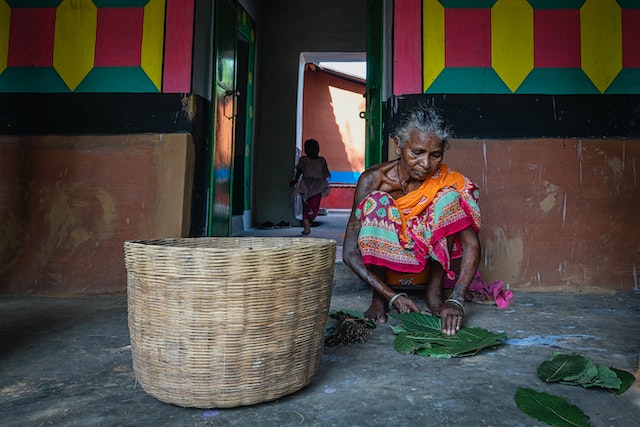
As girls grow up, they keep hearing, ‘This is not your home, you will go one day to your [marital] home.’ But when she gets married, she realizes that the marital home is not hers either.
OUR IMPACT
women and men they serve.
Accounting principles generally accepted in the United States require Landesa to recognize the full amount of unconditional multi-year grants in the year in which they are awarded. Expenses, however, are recorded in the year they are incurred.
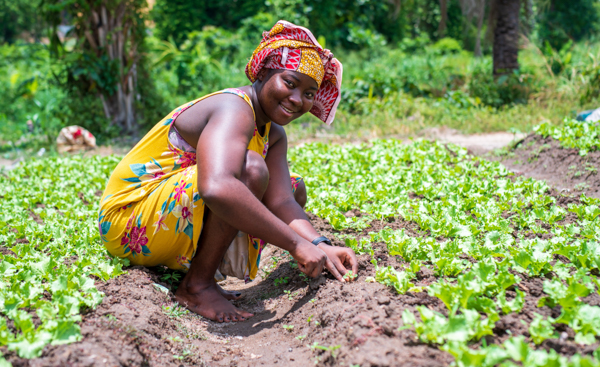
BHP Foundation
BMZ
Co-Impact
Ford Foundation
King Philanthropies
MacKenzie Scott
River Star Foundation
US Dept of State
af Jochnick Foundation
Anonymous (1)
David & Araceli Barclay
California Community Foundation
Dovetail Impact Foundation
Fidelity Charitable
M.J. Murdock Charitable Trust
Mastercard Foundation
Moccasin Lake Foundation
Oak Foundation
James & Gaye Pigott
Ronald B. Rankin Philanthropic Fund
Rising Tide Foundation
Schwab Charitable Fund
Wellspring Philanthropic Fund
$25,000 - $99,999
Anonymous (2)
Benevity Community Impact Fund
EnCompass LLC
Growald Climate Fund
Ashley Hayden & Noah Kolman
The Houssian Foundation
Deonne & Janet Kahler
Vikesh & Kiran Mahendroo
Mary M. O'Malley Charitable Fund
Millennium Challenge Corporation
PACCAR
Propel Capital
Darshana Shanbhag & Dilip Wagle
Stewardship Foundation
Patty Stonesifer
TetraTech
USAID
$10,000 - $24,999
James Cardillo & Patricia Kern-Cardillo
Lenore Hanauer
Phil Harvey
Sally Jewel
Marty Krasney
Jennifer Potter
Paul Silver
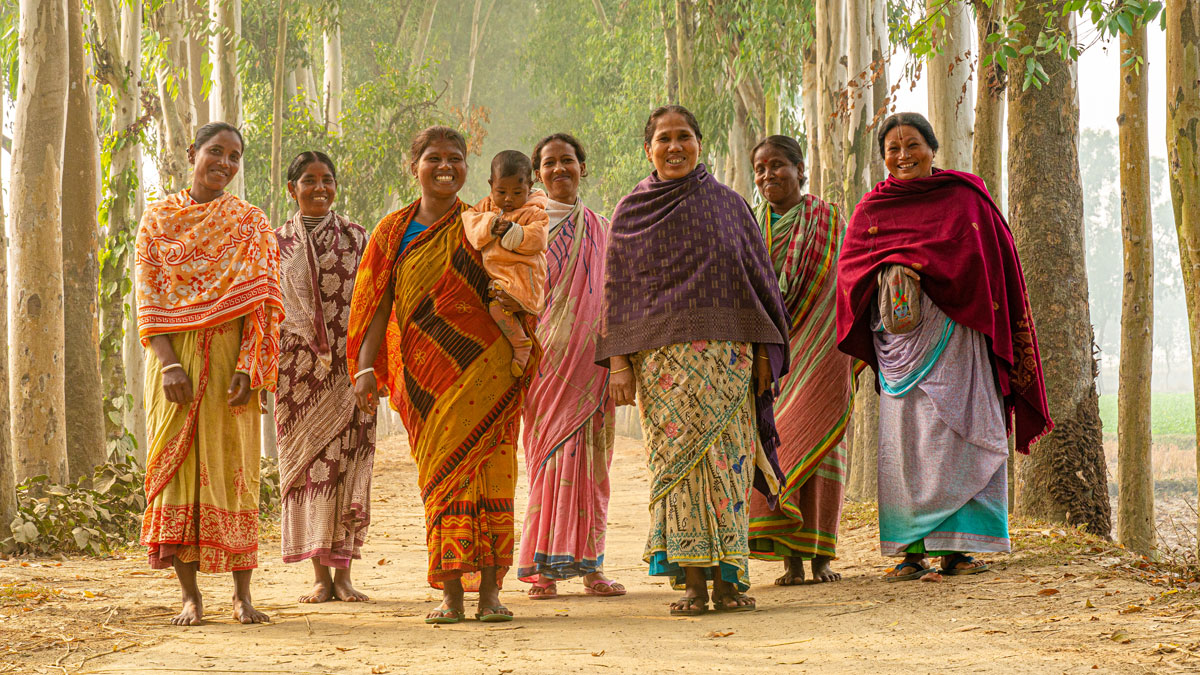
$5,000 - $9,999
Clif Family Foundation
Randi Hedin
Titi Liu & Eric Rosenblum
William & Sally Neukom
PCS Foundation
Kathleen Pierce
Jill Ruckelshaus
Vanguard Charitable
$1,000 - $4,999
Anne Anderson
Luciana Aquino-Hagedorn
Virginia Baeten
Judith E. Bendich
Chris & Chrissie J. Drape
Fiduciary Trust Foundation
Diana Fletschner
Bob Gomulkiewicz & Andrea Lairson
Christine Grumm
Serena Hamann
Tim & Chitra Hanstad
Adolf af Jochnick & Elizabeth Jochnick
Chris Jochnick & Paulina Garzon
Ruben Kraiem & Elizabeth Leiman Kraiem
Ping Li
Doug Love & Rachel Running
Michael Hirschhorn & Jimena Martinez
Christian & Alfreda Murck
Margaret Niles & Stephen Garratt
Beth Roberts
Tyler Roush & Thy Nguyen
Mark Ruffo & Jared Baeten
Margaret Stanley
Hugh Straley
Ronald & Elizabeth Sugameli
Wilma Wallace & Richard Meyers
Lowell Weiss & Kristin Thompson
$500 - $999
Artisan Dental LLC
Britni Bethune
Andrew Cardillo
Maren Christensen
Joel Dalenberg
Patrick & Cindy Dawson
Tracy & Tom Garland
Good Today
Global Giving
Elizabeth Horn
JP Morgan Charitable Fund
Wanjiru Kamau-Rutenberg
Heng-Pin & Shirley Kiang
Parker L. Krasney
Margie Lane
Linda Low
Rebekah Miller
Eric and Julie Nelson
Terry & Kathy Proctor
Tamarack Randall
Kristin Savage
Yifan Song
Andrea Voytko
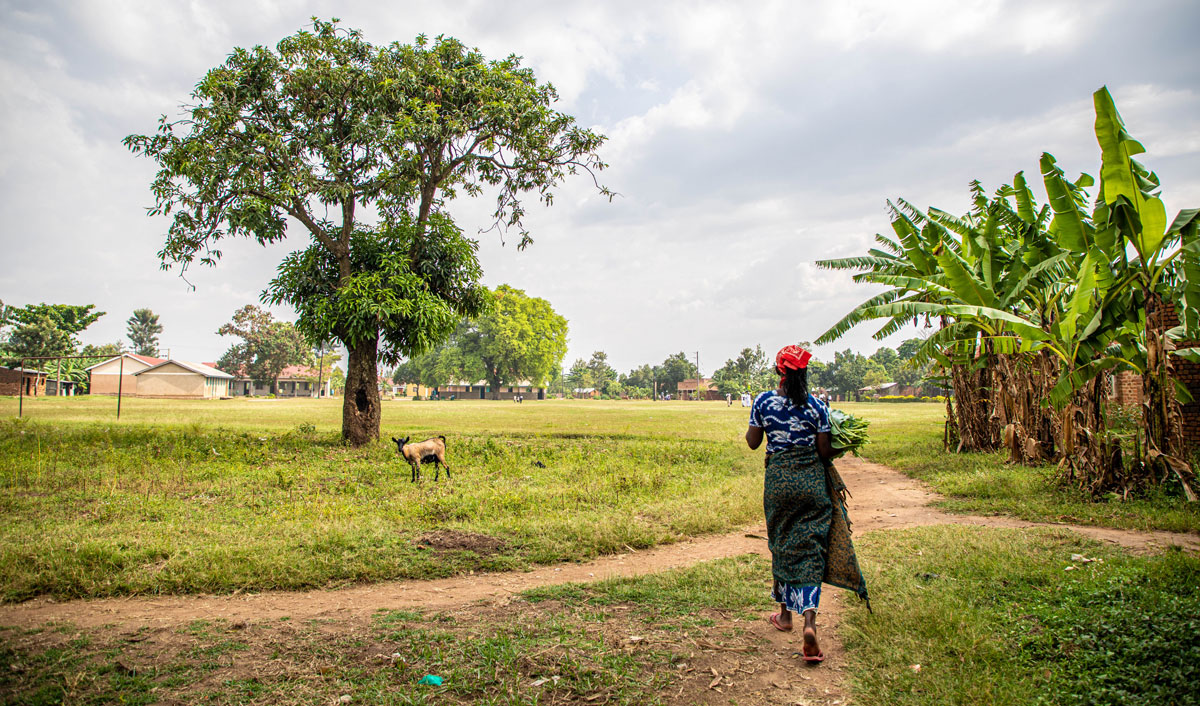
$250 - $499
Alice Adams
Amazon Smile Foundation
Jason Adkins
Shauna Bennett
Connie Celum
Maikaru Douangluxay-Cloud
Jill Ford
Heather Gorman
Libby Hart
Tina Hixson
Mary Hotchkiss
Ludwig Kolman
Jalisa Lee
Margaret McClung
Shelley Morrison
Ann Morrison
Peter Ormiston & Donna Walzer
Dewey Potter
Jeff & Beverly Riedinger
Leonard & Christine Rolfes
Scott Schang
Haley Smith
Kim Starkey
Danielle Thirumalai
Steve Vitalich
Washington State Combined Fund Drive
Mark & Zuzana West
$100 - $249
Anonymous (5)
Stephen & Kathleen Azevedo
Kathleen & John Braico
Adrianne Burns
Marie Cooper
Erin Inclan
Krista Jacobs
Mark Jwayad
Janet Knox
Kylee Krida
Harris & Jane Loeser
Claire Lynch
Ellen Marson & Chris McCall
Lincoln Miller & Nancy Sapiro
Rianna Moore, PhD
Anne Nolan
Colleen O'Holleran
Kylie Palzer
Brian Rawson
Michael S. Rogers
Judith M. Rose
David Schilling
Kenneth Scott & Carla Bernardes
Mary Beth Seifert
Sugar Beet Food Co-Op
Anthony Waldron
Keri Watson
Up to $99
Bobbie Adams & Richard Kissel
Almeera Anwar
Amanda Barber
Richelle Bixler
Cynthia H. Carter
Jan Everman
Nancy & Terry Flajole
Maria Hearing
Reno Hechtman
Jennifer Hillyard
Lizzie Kling
Laurie B. Lippin
Piers Maddox
Tizai Mauto
Kristen Mitchell
Network for Good
Gregory Nielsen
Rebecca J. Palley
Daniel Shively
Gerald A. Smith
Michael Smith
Anonymous (1)
Kaleema Al-Nur
Shamaprasad Bangalore
Paul Bucciaglia
Alex Counts
Kim Dawson
Susan Drummond
Nancy Grout
Antonio Hadlich
David Harnsberger
April Herlevi
Sean Herring
Devala Janardan
Deborah Krikun
Dan Lavoie
Carlo Magnesi
Ian Moffit
Nancy Morrison
Amy Mullen
Shirisha Nampalli
Helen & Matthew Sernett
Thomas Shattuck
Dipa Suri
Grace Valdez
Maria M. Zupan

